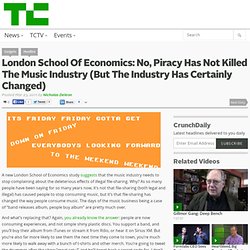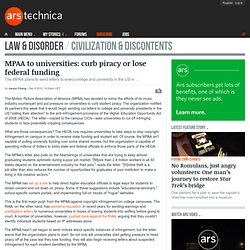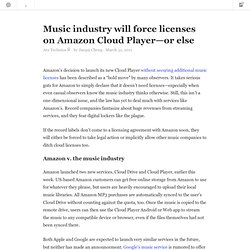

London School Of Economics: No, Piracy Has Not Killed The Music Industry (But The Industry Has Certainly Changed) A new London School of Economics study suggests that the music industry needs to stop complaining about the deleterious effects of illegal file-sharing.

Why? As so many people have been saying for so many years now, it’s not that file-sharing (both legal and illegal) has caused people to stop consuming music, but it’s that file-sharing has changed the way people consume music. The days of the music business being a case of “band releases album, people buy album” are pretty much over. And what’s replacing that? Again, you already know the answer: people are now consuming experiences, and not simple shiny plastic discs.
There’s more stuff involved, in other words. The music business’s problem is that it doesn’t have its finger in any of those pies. So when the labels say “the industry is dying,” well, perhaps their tiny slice of the industry isn’t what it once was, but that doesn’t mean people are going to stop listening. MPAA to universities: curb piracy or lose federal funding. The Motion Picture Association of America (MPAA) has decided to mimic the efforts of its music industry counterpart and put pressure on universities to curb student piracy.

The organization notified its partners this week that it would begin sending out letters to college and university presidents in the US "calling their attention" to the anti-infringement provisions of the Higher Education Opportunity Act of 2008 (HEOA). The letter—copied to the campus CIOs—asks universities to cut off infringing students or face potentially crippling consequences. What are those consequences? The HEOA now requires universities to take steps to stop copyright infringement on campus in order to receive state funding and student aid. Of course, the MPAA isn't capable of pulling university funding over some shared movies, but the organization is capable of spending millions of dollars to lobby state and federal officials to enforce those parts of the HEOA. Listing image by Peter Szustka. Music industry will force licenses on Amazon Cloud Player—or else. Amazon’s decision to launch its new Cloud Player without securing additional music licenses has been described as a “bold move” by many observers.

It takes serious guts for Amazon to simply declare that it doesn’t need licenses—especially when even casual observers know the music industry thinks otherwise. Still, this isn’t a one-dimensional issue, and the law has yet to deal much with services like Amazon’s. Record companies fantasize about huge revenues from streaming services, and they fear digital lockers like the plague. If the record labels don’t come to a licensing agreement with Amazon soon, they will either be forced to take legal action or implicitly allow other music companies to ditch cloud licenses too.
Amazon v. the music industry Amazon launched two new services, Cloud Drive and Cloud Player, earlier this week. Both Apple and Google are expected to launch very similar services in the future, but neither has made an announcement. Uncharted territory.